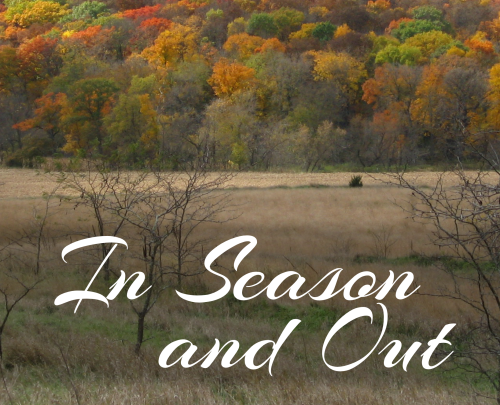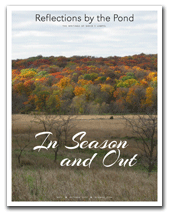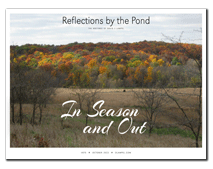Summer and winter, and springtime and harvest,
Sun, moon and stars in their courses above,
Join with all nature in manifold witness
To Thy great faithfulness, mercy and love.“Great is Thy faithfulness!
Thomas O. Chisholm
Great is Thy faithfulness!”
Morning by morning new mercies I see;
All I have needed Thy hand hath provided—
“Great is Thy faithfulness,” Lord, unto me!
For Everything, a Season
My mind is never more appreciative of the four distinct seasons of the Midwest than during the dog days of summer. The rains are few and far between, and the grass is brittle and dry. Temperatures are doggedly high, and the humidity is persistently miserable. And pervading everything is a numbed feeling of, “Can we just move on, please?”
But even in the lingering irritation of that season there remains an encouraging knowledge of the future. For soon the humidity level will drop—and stay there; soon the temperature will lower to a more habitable level; and soon the monotonous greens of the foliage will gradually shift into the rainbow spectrum of autumn.
Of course, with autumn comes also the responsibility to finally do all those things I’ve put off because of the intemperate weather. I will quickly lose my handy excuse for not painting those bare spots on the outside trim, for not trimming the oak trees that are looking a bit shaggy around the trunk, and for not chopping the wood that will keep us warm this winter. With the air clean and bright, and the temps more civilized, some hard work will finally have to be addressed.
Every season contains both the pleasant and the unpleasant. Even as I grumble over the shirt-soaked temperatures of late summer, I delight in the chorus of singing cicadas, the plaintive cries of the frogs and toads encircling the pond, and the evening crickets’ serenade. Soon this seasonal soundtrack will be stilled by the drier air and first frost of autumn.
The perspective of the earth-bound is to allocate everything into one of two columns: Good or Bad. Some things are pleasant, some unpleasant. Some things bring us joy, while some bring us misery. The perspective of heaven, however, is that all things are good, because God made them. Evil and sin may dwell perpetually in His “Bad” column, but God does not subdivide the rest as we do.
The heat and humidity that I find so unbearable are the very same components of summer that cause the corn in the fields to flourish. And the singing of the insects that so delights me, others may find monotonous and irritating.
For everything there is a time. For everything there is a season.
“While the earth remains,
Seedtime and harvest,
And cold and heat,And summer and winter,
Genesis 8:22
And day and night
Shall not cease.”
Regular Variations
Your word, O Lord, is eternal; it stands firm in the heavens.
Psalm 119:89-91 NIV
Your faithfulness continues through all generations;
You established the earth, and it endures.
Your laws endure to this day, for all things serve you.
Young men and old, who today barter goods at the local feed store in sweaty T-shirts and dust-covered work boots, will soon be conducting business dressed in heavy, insulated overalls and rubber boots. Their pickup trucks parked outside, now wearing a film of dry road dust, will soon be under-girded with a dirty apron of accumulated snow and ice. And then their truck beds, now empty, will always contain something of weight, to give their back wheels traction in the ice and mud of winter.
Though there will always be the inevitable variations from year to year (“We ain’t never had a July this dry before!”), like a great wheel within a wheel the seasons keep turning, keep revolving around each other with a dependable, heavenly precision. Out in the fields, those cattle, whose tongues so recently were lolling stickily from their mouths in the wet heat of summer, can put it in the bank: before long they will be huddled together in a clump, combining their body heat and bulk for protection against the icy wind blasting out of the north.
There are times when I appreciate most the very change of the seasons—the variety factor. But more often what I appreciate about the seasons is their consistency—the fact that autumn always follows summer, that winter always follows the fall. And only a sovereign God could manage such predictable precision.
There will be moments this winter when, huddled against the icy blast that burns my cheeks and makes my outdoor work miserable, I will long for the more temperate season of spring. But there will also be moments when I will exult in the clear, crisp bite of that winter chill, moments when I will gratefully be rid of the oppressive heat of the summer months.
But no matter the season, what I exult in most of all is the fact that a dependable, all-powerful God rules over it all. From one season to the next, my fickle pursuits may vacillate and change, but I call upon a God who does not. The seasons of His creation rotate as regularly as a Swiss movement, but in their regular variation they speak most eloquently of a supreme Master who remains always the same.
Thou art not restricted by times and seasons. Our prosperity comes from Thee, and our adversity is ordained by Thee. Thou rulest in the darkness, and one glance of Thine eye kindles it into day. Lord, be not slack to keep Thy word, but rise for the help of Thy people. Both light and the light-bearer are of Thee. Our help, and the instrument of it, are both in Thy hand. There is no limit to Thy power; be pleased to display it and make Thy people glad. Let Thy sacred preparations of mercy ripen; say, “Let there be light,” and light shall at once dispel our gloom.
Charles Haddon Spurgeon
Stuff Falling from the Sky
“…then I will give you the rain for your land in its season, the early rain and the latter rain, that you may gather in your grain, your new wine, and your oil. And I will send grass in your fields for your livestock, that you may eat and be filled.”
Deuteronomy 11:14-15
Here in this place our more sophisticated brethren on the two coasts dismissively refer to as “fly-over country,” no matter the season, something is usually falling to earth from some place overhead.
I was born and raised in these parts, and the rhythms and ways of this land were ingrained in me from the beginning. In the winter months, snow, rain, even ice would fall from the sky—if not with clockwork dependability, it was at least sufficiently reliable to remove winter coats from the back closets and to wax the runners of my Radio Flyer in anticipation.
In the spring, rain would reliably fall from the sky, reawakening life from the frozen soil. Rivers of runoff would flow down the gutters on either side of our hill on my walks to and from grade school—dressed, of course, in my yellow slicker with detachable hood and my buckle boots. In the summer, rain would continue to fall, if less frequently, keeping our backyard garden green and growing.
As summer dwindled down to the faded, drier days of autumn, soon a different form of precipitation would fall: colorful, drying leaves. As if prefiguring the approaching snowfall, the leaves would fill the air, drifting down to collect upon the browning lawns of the neighborhood.
When Linda and I lived on the west coast, the natives there declared the monotonous weather “perfect.” To us, however, the weather seemed unnatural, artificial. There wasn’t that comfortable seasonal rhythm in which our bodies and minds had been born and raised. Winter snow was nonexistent, replaced by infrequent rain. Summer rain was virtually unheard of (and deemed a curse by the local weather forecasters). The musky, melancholy grace of autumn never occurred, since most trees in the area never shed their leaves. And temperatures (at least to our senses) were maddeningly constant.
For two decades we yearned to return to where something more natural than smog fell from the sky.
Now we live in the same climate in which we were raised—where the same seasonal rhythm is played out, with only minor variation, year after year. I may no longer go sledding down the nearest hill after a winter snowfall; I may no longer heave my considerable bulk into the nearest pile of fallen autumn leaves—but those same bits of precipitation and drying foliage still come down from the skies at their appointed times.
Along with being reared where there was weather, I was born and raised to believe in God. As a child I was taught that God lived in heaven and, in practical terms, heaven was located somewhere over my head, somewhere far above the trees, the clouds—above even the breathable air. Heaven was out there beyond the stars, beyond the cosmos, beyond anything known by man.
In any case, no matter where I might be, God was up.
So it was only natural that I would come to associate the stuff falling from the sky with God. After all, the rain and snow seemed to fall from nothing more than thin air. Even after I learned that they actually fell from clouds, it still seemed more poetic to someone born a dreamer that they emanated from nothing more material than the Almighty’s hand. Only later did I learn that God’s word confirms my youthful suppositions.
The meteorologist knows that there is a specific, natural explanation for every drop of rain and every flake of snow that falls from the sky. The naturalist can expound at length about the climatic and seasonal influences upon deciduous trees that cause them to drop their leaves every year. But the poet knows that above science is heaven—and the hand of God. The believer knows that even before He created man, God created (and thus controls) science. Science may have its rules, but God created the rules; clouds may form according to natural laws, but God created those laws.
So it is right and true to see God in the rain, the snow, even the cascading leaves of autumn. It is a righteous supposition to see His purposeful hand in all the stuff falling from the sky, for He is sovereign over it all.
A Bucketful of Days
Autumn lingers upon the breast like pleasant memories from a good friend’s visit, like the fresh-scrubbed oxygen that a thunderstorm leaves behind. It is a time of change, when every morning brings new colors, new smells, and an altered vista. It is a time when even as the pace of change quickens in the natural world, the pace of man slows. It is the season of meandering strolls through multi-hued glens, through the melancholy fluttering of leaves falling to the ground.
Autumn is a time of introspection, when the musk of drying foliage and loam slow the mind to consider days past, the highs and lows of a life. Every season has its own beauty, but autumn, like spring, brings with it a mood. If spring exults in new life, autumn examines the old; if spring is the anticipation of tomorrow, autumn is a meditation on yesterday.
And as the warm nostalgia of autumn fades into the steely clarity of winter, our thoughts turn inward. So much of the Christian life is process; so much of it is just paying attention. What good is our stumbling, if we never look back to understand why we tripped? What good is a victory, if it doesn’t leave us more humble? What good is life itself, if tomorrow doesn’t find us better than we were the day before?
The rich umbers and golds of autumn are now fading. In their place remains only the gray and black framework of the naked timber, a tangled clutter, branches interwoven and whipping against each other in the gathering north wind.
Not that long ago, as I felled trees and sectioned their wood for the fireplaces, I worked in shirtsleeves, sweating in the dry, warm air. The sun was still bright, the grass still green, the clothing of the trees still blazed rainbow colors. Today the sky is a leaden gray, and it may not be long before we are visited by the season’s first snowfall.
In the magnificent untidiness of the Christian walk, it is necessary to pause as the leaves of autumn transition to the cold of winter, to examine the grace just spent. God leads us through our days expecting us to pay attention: to listen, to observe, to learn. He expects us to grow toward, not away from Him. He expects us to stop every once in a while and listen for His voice.
Change is all about us as autumn transitions to winter, and in the midst of change we must slow our own pace to listen to the voice of God, and the lessons He waits to teach us.
God’s nature never stands still; it is always moving, pressing into the next day. Today’s tree will be taller tomorrow—or it will be fallen, lying dead and rotting in last year’s leaves. Today’s grass, luxuriously pliant and green, will tomorrow be brittle and parched, brown and sharp to the touch. The fawn that accompanies her mother today will next year be taller and perhaps on her own.
Time never stops. Season passes into season, change inevitably comes. As I gaze out my window, beyond the pond, into the now-naked trees of the woods—I feel a sense of urgency. What have I done for the Lord today? The days continue to tick by; what am I doing that will yield eternal results? Am I using well the time God has given me?
The person I pass on the street in town today, will tomorrow be older—or dead. What have I done today so that his tomorrow will be something more than just his being one day older? If he is dead, will I have done something to affect his eternity?
All praise to the God and Father of our Master, Jesus the Messiah! Father of all mercy! God of all healing counsel! He comes alongside us when we go through hard times, and before you know it, he brings us alongside someone else who is going through hard times so that we can be there for that person just as God was there for us.
2 Corinthians 1:3-4 The Message
Will God’s kingdom be better or larger tomorrow, because of something I’ve done today? Have I filled up each day using the gifts God has graciously entrusted to me? Have I used them for Him, or have I squandered them in the service of an earth-bound dream?
Some young plants and trees still need to be watered in the autumn. They ask for deep-rooted sustenance to carry them through the dormancy of winter. As I fill the old galvanized bucket with water and carry it to the base of the small tree I notice a few drops leaking from the bottom edge, trailing a glistening path of drips through the drying leaves that carpet the grass.
And I realize that when we are born, God gives each of us a bucketful of days. He fills our bucket to overflowing, pouring into it, as well, all His goodness and blessings, gifts and opportunities. As time passes, the days drip out, one by one, until, at our earthly end, the bucket is dry. Our days have run out. Our gifts and opportunities have reached their end.
No more.
Each of us begins with a bucketful of days. But only God knows how many days the bucket holds.
Issue #870, October 2022
Reflections by the Pond is published monthly at dlampel.com and is © 2022 David S. Lampel.
Unless otherwise indicated, all Scripture is from the New American Standard Bible (Updated Edition). This and all of our resources are offered free-of-charge to the glory and praise of Christ our Lord.



